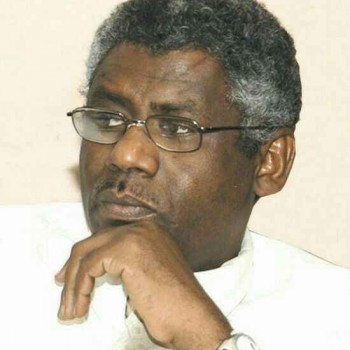Tin Drums (1)

As I see it
Adel El-Baz
1
The tin drums that Qahat beat before the war were resounding until they almost deafened our ears (Oh the framework, oh the war) and when the war broke out, the same drums began to change their rhythms and melodies (No to war) and thus we moved from threatening war before it happened to standing against the war in order to conceal support for Janjaweed under the slogan (No to war). But this slogan did not stop the war and remained empty, hanging in the air as a new tool for concealment and profiteering, and so it was necessary to give it great momentum by exaggerating the consequences of the war, or rather the expected disasters, and here the playing on the dead strings began. How?
2
They said at the beginning of the war that it would develop into a civil war between the different tribes and ethnicities in the country, why and how? There is no explanation.. The war did not develop into a civil war and maintained its nature, a rebellion by forces that were regular and quickly turned into looting brigades and nine long ones and nothing more.
They said that the war would divide Sudan, and so far, a year and a half, there are no indications that the militia and its international and regional supporters are able to divide Sudan, particularly after the failure of their attempts to seize El Fasher.
They resorted to another threat, which is that this war will expand to ignite a fire in all neighboring countries. It turned out that this is also a lie.
A year and a half and the war has not reached any country, even the countries supporting the rebellion are now enjoying safety.!!
Finally, their genius came up with a new story, which is the story of famine. Every day, a new report claims that famine has occurred in Sudan or that it is inevitably occurring, although the numbers belie this claim, as we will see, but they insist on it to intimidate.
3
All these reasons that they are mobilizing have one goal, which is to stop the war now and without conditions, and without implementing what was agreed upon in Jeddah, not out of love for Sudan or mercy for its people, but because stopping the war now and in this way will reposition the militia once again in the military establishment and the political arena, which will give the allies of Janjaweed or their agents a chance to return to the arena on the backs of Thatchers.!!.
Let us now come to the details. Why did not a civil war break out in Sudan as they expected?
4
Despite the availability of the nine known reasons that always cause the outbreak of civil wars in Africa. (A civil war is an armed conflict that occurs within a single State between two or more groups of its population. These wars often arise as a result of multiple differences and then witness ethnic, regional, religious or ideological alignment.)
Despite the availability of these reasons, the civil war in Sudan did not and will not break out, why.? Because among all these reasons, there is no reason for the rebellion of regular forces against the national army that carries the characteristics of a civil war and has the potential to develop.!!
This is because the forces rebelling against the national army were part of it, carrying in their genes the same formations of the multi-ethnic and multi-regional army, as national armies have multiple ethnicities and ideologies in addition to regionalisms as well as the factions rebelling against them. Therefore, when a rebellion occurs against the SAF , it is not possible for a civil war to break out between the ethnicities that make up the rebel factions, otherwise the rebellion will fail immediately and will not achieve its goals.
The Rapid Support Forces RSF rebellion was based on a political ambition that was not supported by a unified idea, ideology, ethnicity or regionalism, and was not capable of developing in any direction.
5
The Rapid Support Forces RSF include Misseriya, Zureigat, Bani Halba and other ethnicities, as well as the national army. When the rebellion broke out, it did not turn into a civil war between ethnicities, nor a tribal war, nor a regional war due to the diverse ethnic, tribal and regional composition within the Rapid Support Forces RSF and the SAF. Therefore, you find the Misseriya and the Rizeigat present in the two warring camps, and for this reason, despite the availability of other reasons, the war did not turn into a civil war.
6
There is one chance for this war to turn into a civil war, and that is in the event of the complete collapse of the state.
Only then is there a great possibility for a change in the nature of the war. However, if the State remains present and cohesive, it is not possible for us to witness a civil war in Sudan.
This is the experience of Rwanda after the collapse of the state, Lebanon and Yugoslavia. What prevented Ethiopia from slipping into civil war during its last war is that the Ethiopian State remained cohesive and did not collapse.
The rebellion of the Tigrayan and Amhara forces did not automatically lead to a civil war because of the cohesion of the State. Otherwise, we could have witnessed countless civil wars in Ethiopia between all ethnicities, regions and even religions.
Therefore, those who are waiting for a civil war among the Sudanese must wait for the complete collapse of the state first, and this will not happen, God willing, despite their plots that would remove mountains.
We continue



